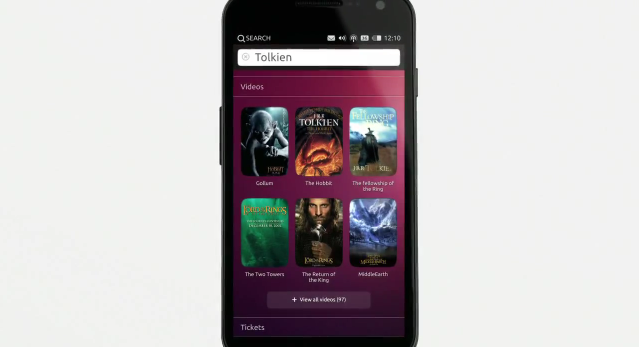

On the first working day of 2013, Canonical finally took the wraps off a long-rumoured project, to show Ubuntu running on a phone for the very first time.
The new software is not just any phone OS, but a fully-featured Ubuntu on a smartphone, with an interface designed for touch interaction and small screen size.
The company hails this creation as the “commercially viable open source alternative” to the “duopoly” of iOS and Android.
While it will work well on entry-level phones, the real beauty of the system is in the way it can become a PC. Continuing where the Ubuntu on Android project left off, the phone will work as a regular Linux computer capable of running remote Windows applications, once connected to a monitor and a Bluetooth keyboard.
Founder Mark Shuttleworth was giddy with excitement at the Canonical London offices on Tuesday, completely aware of the wild online rumours surrounding this launch. He briefly talked about convergence, before outlining the vision of Canonical: “one OS to rule them all”, across your TV, PC, tablet and phone.
Ubuntu on a phone features a new, clean interface that starts with the lock screen, called the “welcome screen” by the Canonical staff. On it, a fluid, flowery pattern displays app information, changing in response to the number of missed calls and texts.
The interface doesn’t use hardware buttons at all, relying instead on interaction with the touchscreen. Swiping from various points at the four edges of the display serves as a shortcut to half a dozen commands, including access to phone settings directly from any app without quitting it.
Swiping from right to left also allows users to instantly switch between running tasks, and of course, the traditional Ubuntu interface bar is still there, on the left on the screen.
Developers have built in the option to quickly hide the top status bar, which makes a lot of sense on a platform where the screen space is in short supply.
According to Shuttleworth, Ubuntu Phone simultaneously serves two very different purposes: it will provide better performance on “lean”, entry-level smartphones, while at the same time extending and enriching the functionality of “superphones”, which can now serve as fully-featured computers.
The phone version of the OS will support both HTML5 apps written for smartphones in general, as well as the native apps specific to Ubuntu, developed using OpenGL, QML and C++. “Gaming on Ubuntu phone is going to be great,” said Shuttleworth, quoting a 15 percent rise in processing speed when compared against the competitors.
The founder and current lead of strategy and design also talked up the enterprise potential of the phone OS as a single, secure solution that countless IT professionals already know and love. After the release, it will be managed just like a desktop or a server, using the familiar Ubuntu tools.
The phone OS will be pretty much interchangeable with Android, since it uses the same kernel. Theoretically, a manufacturer could switch from Google’s mobile OS to the open source alternative in a couple of days. Despite this convenience, Canonical has yet to convince a single OEM to give the system a try.
But while the hardware support is still lacking, the company is confident it will have the first Ubuntu phone out in Western Europe before the end of this year.
“Ubuntu will hand users the ability to enjoy a unified experience across the multiple platforms on which they lead their digital lives,” commented Ian Drew, executive vice president of Marketing and Business Development at ARM. “It will also help to deliver the highly personalized interface, operating system, content and applications that are central to the creation of compelling new digital experiences.”
Ubuntu on a phone will be on display at CES 2013 in Las Vegas next week. Canonical and the army of open source developers continue to work on Ubuntu version for tablets, but there is currently no definite release date.
You can see the new phone OS in action below.
How well do you know open source software? Take our quiz!
American space agency prepares for testing of Boeing's Starliner, to ensure it has two space…
As UK and Europe develop closer military ties, European Commission says it will invest €1.3…
Zuckerberg seeks to revive Facebook's original spirit, as Meta launches Facebook Friends tab, so users…
Notable development for Meta, after appeal against 2021 WhatsApp privacy fine is backed by advisor…
First sign of shake-up under new CEO Lip-Bu Tan? Three Intel board members confirm they…
Trump's nominee for SEC Chairman, Paul Atkins, has pledged a “rational, coherent, and principled approach”…